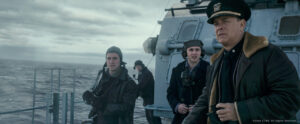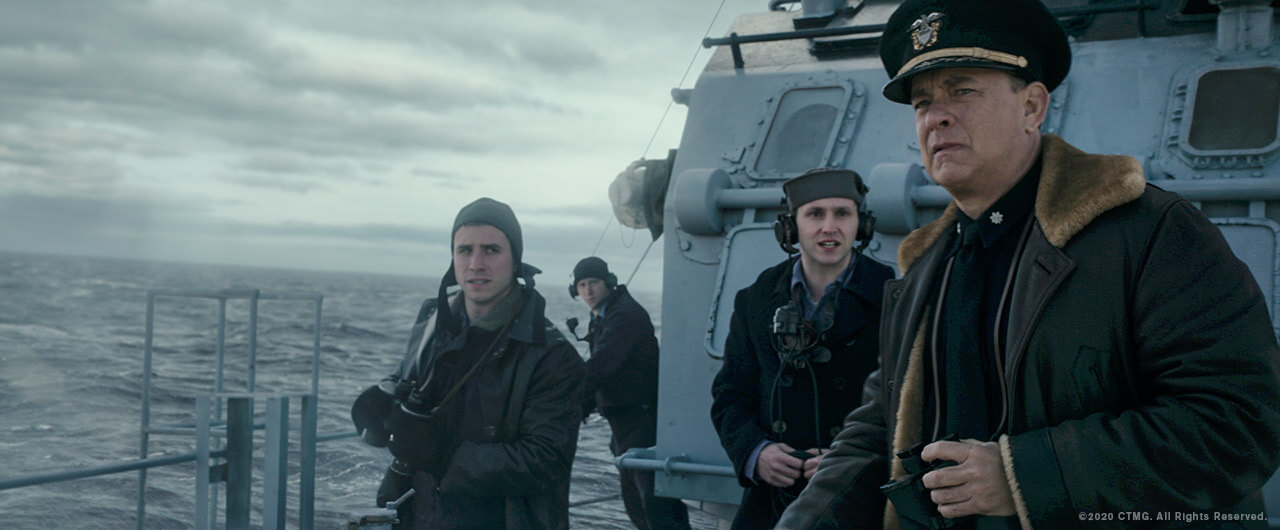Movie Info
Movie Info
- Director
- Aaron Schneider.
- Run Time
- 1 hour and 31 minutes
- Rating
- PG-13
VP Content Ratings
- Violence
- 3/10
- Language
- 2/10
- Sex & Nudity
- 1/10
- Star Rating
Relevant Quotes
So we can say with confidence,
“The Lord is my helper;
I will not be afraid.
What can anyone do to me?”
Remember your leaders, those who spoke the word of God to you; consider the outcome of their way of life, and imitate their faith. Jesus Christ is the same yesterday and today and forever.

Tom Hanks both stars in and wrote the script for this WW 2 movie directed by Aaron Schneider. Based on the novel “The Good Shepherd” by C.S. Forester, it deals with a little filmed aspect of the war, the shepherding of merchant vessels that were Great Britain’ life line during the early days of the Nazi take over of the continent. Hitler’s submarine “wolf packs” at first were sinking Allied ships as fast as they could be made, thus threatening England with economic disaster and weakening her will to resist,
We are introduced to Hanks’ U.S. Navy Capt. Ernie Krause while he is praying for strength and guidance. He meets his lover Evelyn (Elisabeth Shue) in a San Francisco hotel lobby where they exchange Christmas gifts. He gives her a Christmas tree ornament inscribed with the phrase “Yesterday, Today, and Forever,” and receives a pair of monogrammed slippers. We will see more of these two gifts than of her, the rest of the film taking place on board a U.S. escort destroyer. (The phrase comes from the Letter to the Hebrews, expressing both his love for Christ and for her. No faith-based producer could have made the Captain more devout than those who made this film!) Now that the U.S. has entered the war, the Captain informs her he is being sent east for training there and in the Caribbean. He asks that she marry and come with him, but she insists that they wait until the world is in less turmoil.
Jump to early 1942, and Captain Krause sets sail on the USS Keeling (referred to on the radio as “Greyhound”) He is the Commander of four destroyers assigned to protect a convoy of 37 supply ships. This is his first trip, so he is understandably anxious. So are his crew men who watch his every move. For the first leg of the trip they have air protection, but the PBYs have a limited range. There is a dangerous zone dubbed “The Black Pit” which requires 48 tense hours to cross before the Brits can provide such protection. This is the deadly zone where Hitler’s wolf packs wait, eager to sink as many ships as possible.
Not long after the convoy is on its own, Krause finds himself tested to the utmost. The cat and mouse game played with the U-boats’ wily commander is nerve wracking, Krause able to get no sleep and drinking only the coffee of the appetizing meals that his African American mess officer Cleveland (Rob Morgan) bring to him on a tray. The cook urges him to eat, but each time a new danger arises demanding the Captain’s full attention.
They have to cross the “Black Pit,” a dangerous stretch of the Atlantic out of aircraft range, and over the course of 48 nerve-wracking hours, Krause and his men play cat-and-mouse with crafty U-boat commander of the “Grey Wolf” pack. He will learn the hard way about the clever decoys the Germans use to lure them away from defending the cargo ships. He will have to make the wrenching decision of whether to go and rescue the crew of a torpedoed vessel or rush to the rear of the convoy which is unprotected. He chooses the mercy mission, but when the discovery is made that only four sailors were plucked out of the water while another ship that he could have protected was sunk, he has to live with the guilt. His feet become so chaffed by his service shoes that they bleed, revealed when he has his messenger bring him the slippers Evelyn had given him.
As each day passes new dangers arise. During one encounter with a U-boat that surfaces in the midst of the convoy, the Keeling is wracked by bullets fired by the merchant vessel on the other side of the U-boat. In another fierce firefight with a U-boat his ship is hit by canon fire, killing and wounding several of his crew, including Cleveland. One of the four destroyers is so badly damaged one night that it has to be abandoned. Krause himself has to resort to swift maneuvers to avoid torpedoes aimed at his ship, in one encounter barely dodging two of the water missiles. Several times the Germans use psychological warfare, the arrogant German commander boasting over the ships they have sunk and taunting their pursuers. He states that “The Grey Wolf is so very hungry,” and “The sea favors the Grey Wolf on the hunt, not the Hound on the run.”
Hanks turns in an excellent performance as the rookie commander who feels the pressure of his baptism by fire. And we never doubt his devoutness: a small “Yesterday, Today, and Forever” sign decorates the wall of his cabin. He quotes a Scripture when under pressure, and most of all, when they manage to sink a U-boat and one of his officers rejoices that 50 krauts have been killed, he quietly rejoins, “Fifty souls have been lost.” He is very much the reluctant warrior, reminding me of President Lincoln’s reactions to reports of casualties on both sides.
Hanks is ably supported by Stephen Graham as his navigator Charlie Cole) and Rob Morgan in the underwritten role of his faithful cook, plus a boat load of others, even including his son Chet Hanks. The dialogue is sparse, the majority of it Navy jargon spewed out and repeated by the recipients with no explanatory remarks intended for the audience. The battle scenes are totally engrossing, making me long for, especially during the aerial shots, for the film’s intended big screen. Blake Neely’s music perfectly enhances the excitement, and suspense, of the battle scenes, and invites us to rise out of our seats during the moments of victory.
Some of the criticism of the film is justified. Not enough background is given of Krause’s relationship with his lover is given, and I also wished for a few more details of the relationship between Cleveland and his captain. The latter would have made his loss all the more powerful. Also, we are left to guess at the inner doubts, revealed in the novel, of Krause’s self-doubts over his leading younger but more experienced ship captains. Was he anxious over what they thought of him or that they might chafe over some of his decisions, some of which did turn out badly? Also, the Navy was as segregated then as was the Army, so it would have been beneficial for us to see how the two might have bridged the unfair inequality imposed on them. But these are minor qualms, the film being a worthy tribute to those who strove to make sure that the Brits, and later the grunts who eventually would be on the firing line on the continent, would have enough supplies and ammunition to defeat the ruthless enemy.
This is another war film that does not glorify violence but instead makes us appreciate the men who endured it. It was gratifying to see during the end credits archival footage of the men and ships who braved the dangers of the wolf packs. We are informed that 3,500 ships carrying millions of tons of cargo were sunk and 72,200 men were lost at sea during the war. Though one misses the grandeur that a wide screen would have provided, we can be grateful that Apple TV + will ensure that an even larger than usual audience will see the film.
This review will be in the August issue of VP along with a set of questions for reflection and/or discussion. If you have found reviews on this site helpful, please consider purchasing a subscription or individual issue in The Store.


This movie suffered from the incredible luck and stupid German syndrome. Come on, the first depth charge attack run the ship makes and they bag a U Boat. German U Boats are NEVER going to try to slug it with their guns on the surface with any escorts, much less a fleet destroyer with 5 5″ guns. I never heard of German subs using the radio for psychological warfare. After all , allied radio directional finders were the bane of U Boats. That was what led to the death of the first U Boat I mentioned above.
I’m surprised their expert advisers didn’t catch this.
I guess I so admired Tom Hanks that I overlooked such technical mistakes. Thanks for your observation.
The verse is from Hebrews 13:6-8. There is no chapter 18 in Hebrews.
Thanks for the correction. I’ll fix it.